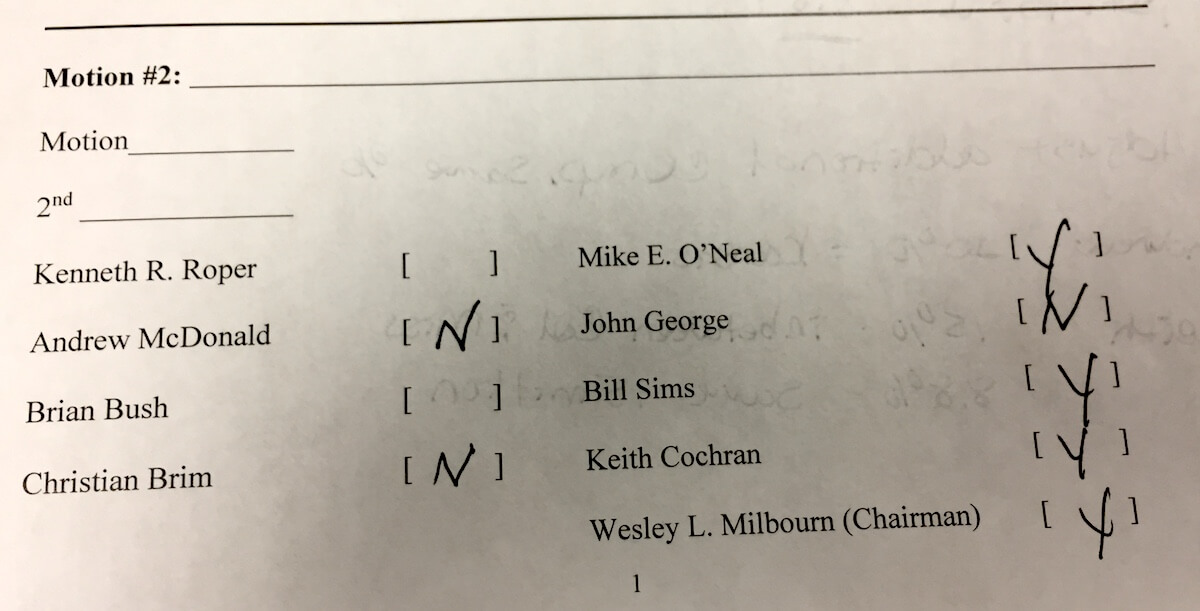
As I photographed the tiny placards featuring names of Oklahoma Legislative Compensation Board members, I apologized to the chairman.
“Sorry,” I said. “The membership of your board is not available to the public. It is not available online.”
Wesley Milbourn, general manager of KFOR television, replied in earnest jest.
“Let’s keep it that way.”
I don’t write about the Oklahoma Capitol in first person very often. Sometimes doing so provides necessary benefits, and sometimes it is the ethical consequence of me having recently written one of our Monday editorials about the same topic at hand.
I believe this piece checks both boxes.
When the Legislative Compensation Board voted Thursday to reduce legislator pay by 8.8 percent — short of the 15 percent, 22 percent and 50 percent figures also suggested — Milbourn and other members repeatedly said their action was not “punitive.”
What’s that old adage? Never believe something until you hear people deny it?
Which brings us back to the Oklahoma Legislature.
Young, modest lawmakers with families hit hardest
Cutting the pay of Oklahoma legislators might seem appropriate considering what an absolute, capital-S Shit Show the past 11 political months have been. Yes, that is the phrase people around the Capitol often use for #okleg2017, though it mostly avoids newsprint.
But as happens all too often in that building, the Legislative Compensation Board sent a political message Thursday while ignoring the bigger picture, functional consequences be damned.
By a 4-3 vote — with two members absent — the LCB dropped rank-and-file lawmaker pay from $38,400 to $34,620.80. The constitutional board could not touch legislator per diem rules, mileage rates or retirement packages, although its unimpressive discussion of the topic showed that the body hardly recognized its limitations or the full picture on legislative pay.
For many affluent representatives and senators, next year’s loss of $3,379.20 will barely register a financial hiccup.
Meanwhile, the board’s action will cause good lawmakers of average means — who overwhelmingly voted “Yes” on the year’s biggest revenue package, if that’s your primary barometer — to lose $3,379.20 in annual pay.
Take Rep. Forrest Bennett (D-OKC), whose old car was stolen on the campaign trail and who now rides the bus to encourage public transit ridership. How often do you think he is asked to support neighborhood causes by virtue of his position in a lower-income district?
Or take Rep. John Pfeiffer (R-Orlando), who married his wife Friday at the Capitol. I don’t know Pfeiffer’s exact family finances, but I do know he is a Marine Corps veteran in the prime of his life who chose to live in a town of 200 people and represent them at the Capitol.
What if either of these two men — who are genuinely committed to progress and who are intellectually curious on matters of policy — would like to have a child?
Or what if they — like several men and women in the Legislature — already did have children? Will $3,300 less for child care annually combined with months away from home dissuade true family men and women from holding office? If so, how many is too many for the price of the LCB’s headline-making political hit?
Midnight on the loading dock
In the end, the LCB’s stunt was the most obvious and poorly executed in an abysmal 2017 of Oklahoma politics. It will only serve to raise the wealth threshold for potential legislative candidates in the future.
Dropping lawmaker pay will fail to hit the pocketbook of successful banker and House Speaker Charles McCall (R-Atoka). Neither will it hike teacher salaries.
If LCB members are aware of these facts, they certainly hid it Thursday. None spoke of this argument, and each wandered back into the comfort of his digital anonymity afterward.
Meanwhile, I sat down with a third young and recently married lawmaker Friday evening for an interview on a separate topic. As we ate slices of pizza, Rep. Mickey Dollens (D-OKC) told me he was already trying to brainstorm additional part-time gigs that he could pursue to make up for his pay cut.
A former athlete, oilfield hand and teacher, Dollens said working nights at a loading dock could be a possibility since it would allow him to continue attending the community events to which constituents regularly invite him.
I ate my slice of pizza and wondered whether those who appreciate Oklahoma’s populist roots understood the difference between a Legislature peppered with average citizens and a Legislature stocked only by the independently wealthy.
Maybe they do.
Maybe they do not.
But when the Legislative Compensation Board meets again — either in emergency or on the third Tuesday of October 2019 — I hope its members consider what I’ve written above.
I also hope lawmakers and those who understand these ramifications speak their minds.
What I don’t hope is that the LCB remains a functionally anonymous bureaucratic board with no public listing of its membership. Let’s not “keep it that way.”
Membership of the Oklahoma Legislative Compensation Board and their votes
https://nondoc.com/wp-content/uploads/2017/11/LegislativeCompensationBoardMembers.pdf” height=”450px”]
(Update: This post was updated at 9:45 a.m., Monday, Nov. 20, to include the photo showing how members of the Legislative Compensation Board voted.)





















